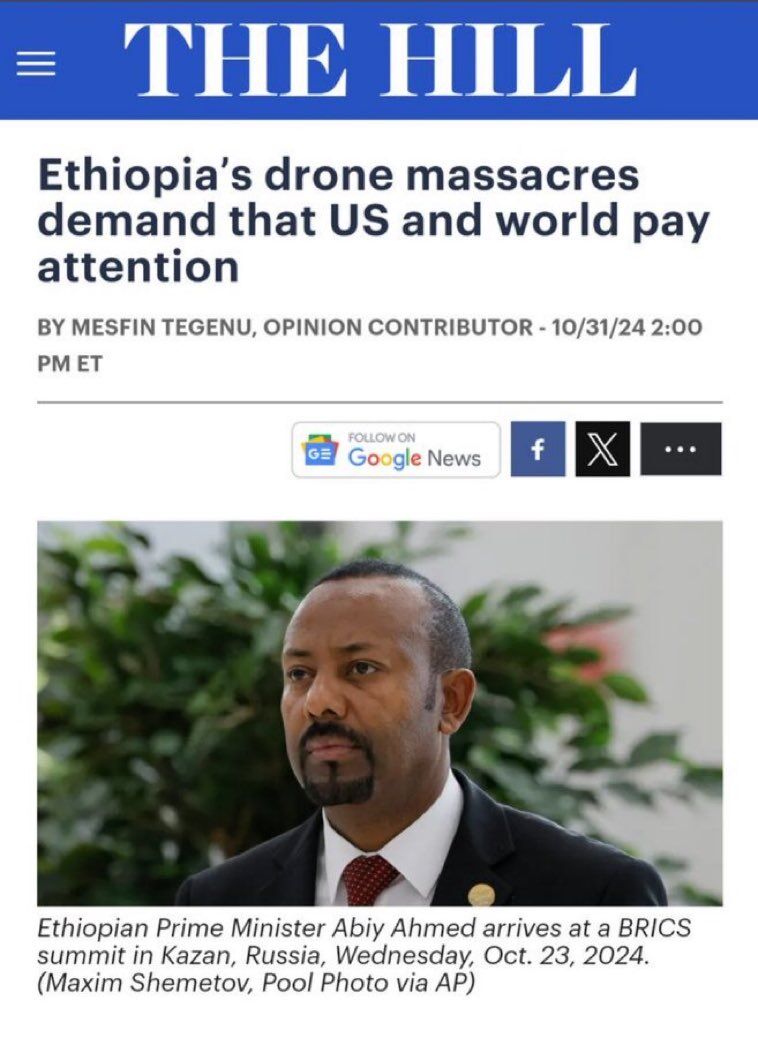by Mesfin Tegenu
The Hill

It was 7 a.m. on a Friday morning when a Turkish-made drone controlled by government forces slammed into a health center in the Ethiopian villages in Gojjam, in the Amhara region of Africa’s second-most populous nation. Prime Minister Abiy Ahmed’s regime says it’s targeting Fano rebels in this northern region, but on this day the dead were civilians, including a nine-year-old child and a 70-year-old village elder.
This was one of the latest in a series of drone strikes that have shaken the Amhara Region this autumn — yet have been largely ignored by the outside world. Credible reports from the Ethiopian Human Rights Commission, the BBC and others say aerial attacks since the start of October have killed more than 200 civilians.
Just four days after the health center was attacked, Fano leaders said a fresh round of attacks in different towns in Gojjam occurred, in and around an elementary school, when five separate drone strikes reportedly killed at least 13 farmers. Other attacks have also targeted schools as well as crowded marketplaces and civilian homes.
The October onslaught by forces loyal to Abiy — who incongruously won the Nobel Peace Prize in 2019 before intensifying ethnic and regional conflict across Ethiopia — is just part of an offensive in Amhara region that the prime minister has ominously dubbed “the final operation.” It has also included door-to-door raids and targeted killings in a so far unsuccessful effort to push back the popular mass resistance led by Fano.
“The Ethiopian armed forces’ brutal killings of civilians in Amhara undercut government claims that it’s trying to bring law and order to the region,” the deputy Africa director of Human Rights Watch, Laetitia Bader, said earlier this year, before the violence intensified. “Since fighting began between federal forces and the Fano militia, civilians are once again bearing the brunt of an abusive army operating with impunity.”
The human rights abuses in Amhara Region are appalling, and so is the sound of silence from most of the world community, distracted instead by its attention to bloody conflicts from the Middle East to elsewhere in Africa while largely ignoring the ongoing slaughter in Ethiopia.
What greatly compounds this tragedy is that Abiy’s campaign of ethnic cleansing, including his considerable drone purchases from a Turkish manufacturer, is most likely funded in part by the recent large rescue package from the International Monetary Fund and other Western aid. Those dollars were intended to stabilize Ethiopia not only by shoring up its troubled economy but creating the conditions for a lasting peace.
Instead, it’s already clear that this summer’s four-year, $3.4 billion bailout approved by the IMF, along with another $1.5 billion in infrastructure aid from the World Bank and open doorways to other relief programs, has done exactly what human-rights groups and other critics have warned would happen: Replenish Abiy’s coffers to fund his seemingly unending civil war machinery. That has only been exacerbated by the regime’s increasingly close relationship with the United Arab Emirates, which has included the oil-rich Gulf nation offering considerable aid to the federal military.
To make matters worse, the one major condition that was imposed by the IMF — to stop artificially propping up its currency, the birr — has also had the effect that many feared of causing real, short-term economic harm. Now, concern that rapid inflation tied to the new monetary policies will further damage Ethiopia’s manufacturing sector and other key industries is beginning to rattle foreign investors, who fear that financial problems will further unravel the country’s weak social fabric.
Just two months after the IMF’s relief package and the floating of Ethiopia’s currency, Chinese investors — who in recent years have competed with America and the West for influence in the Horn of Africa, thus propping up Abiy’s ambitions — are starting to leave the country as they fear for its future.
“Ethiopia is facing serious difficulties,” a key representative of Chinese business concerns in Ethiopia recently commented, referring both to inflation and the odds of an economic downturn but also the security concerns around the nation’s ongoing civil wars. Although Chinese sources have invested some $5 billion in hundreds of Ethiopian projects in recent years, many are now looking instead to neighboring countries such as Kenya or Tanzania. This could accelerate a downward spiral.
